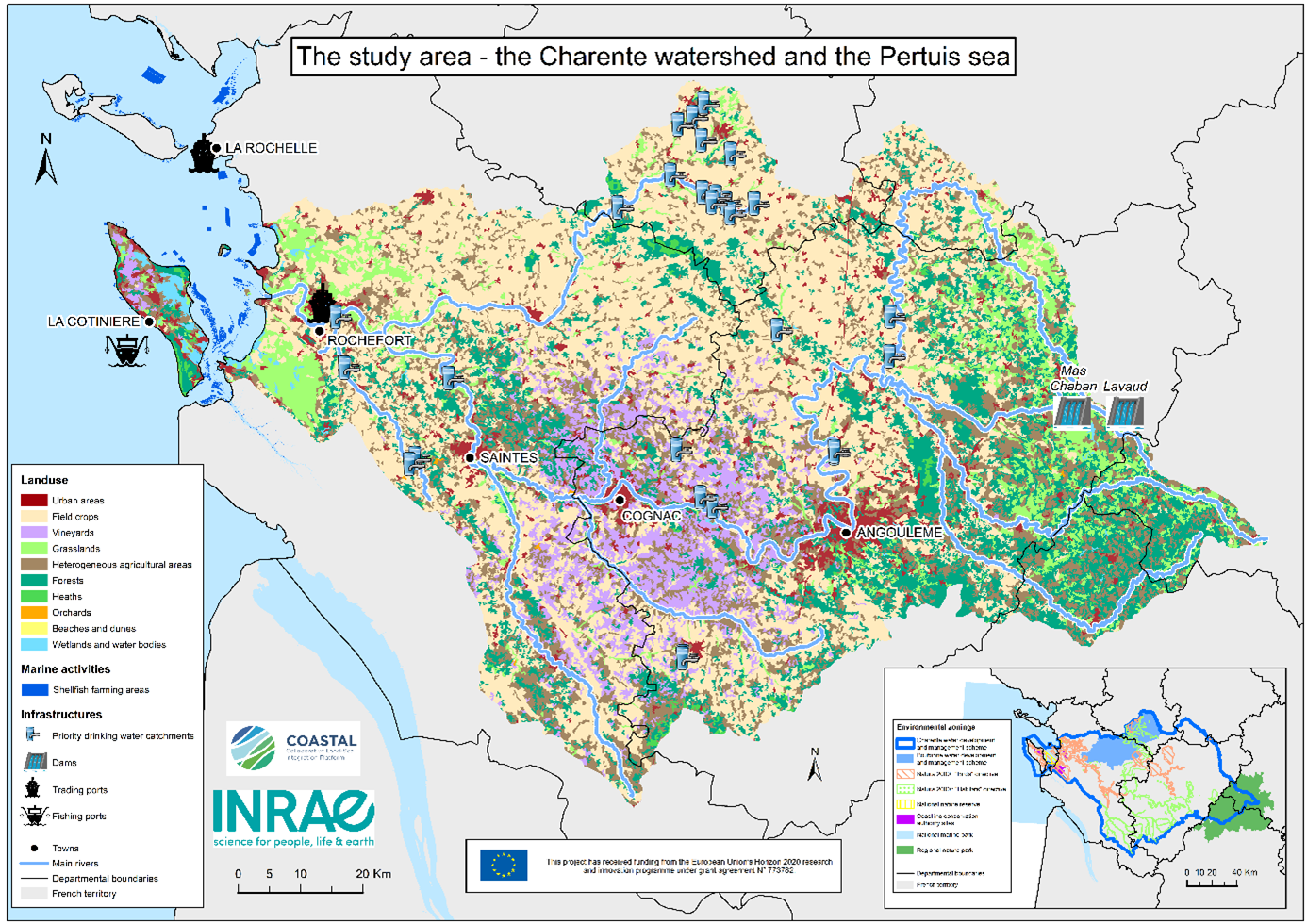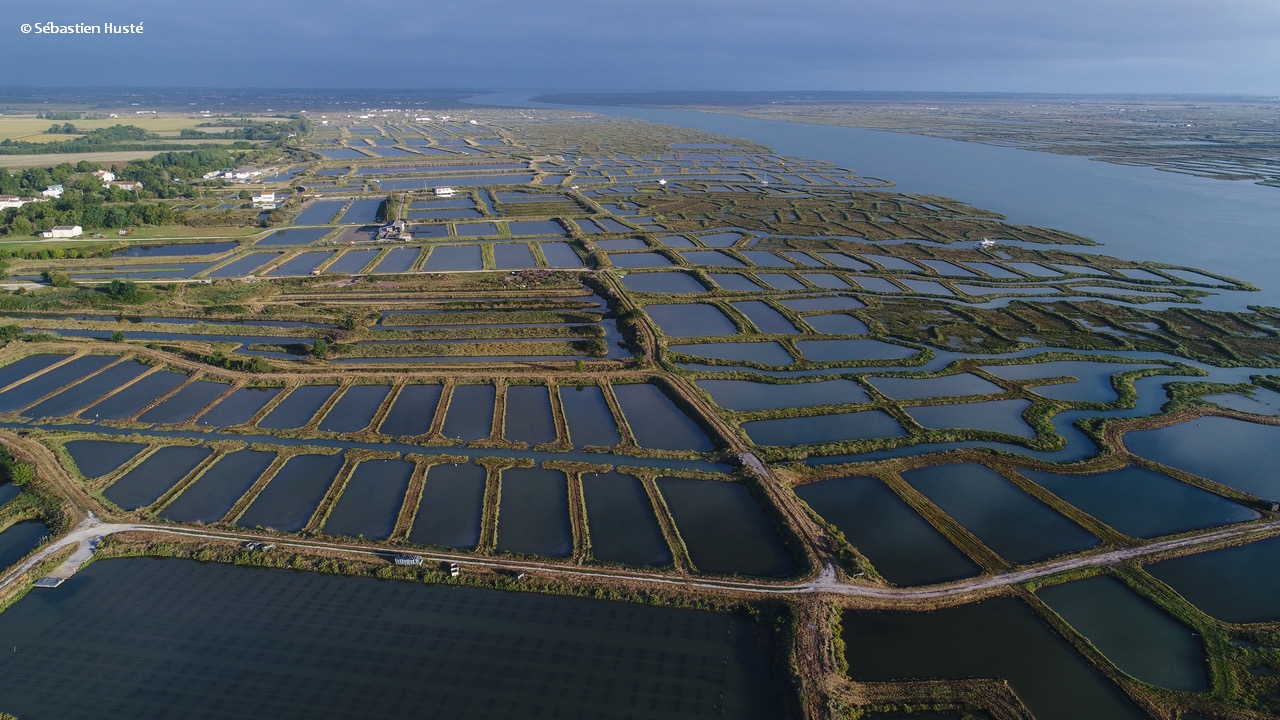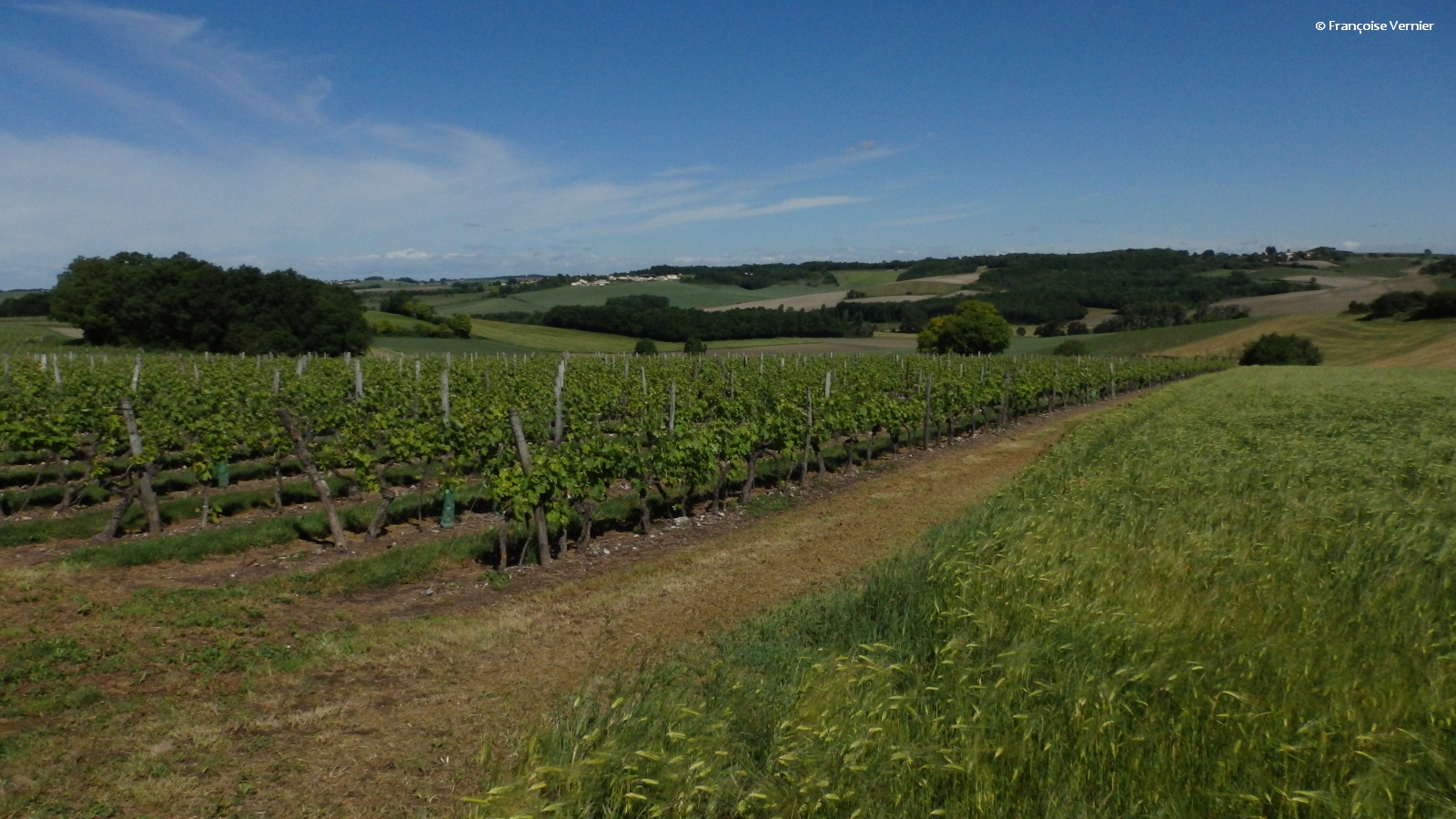Location and characteristics

The Charente river basin in South-West France is predominantly rural and covers an area of 10,500 km². It is linked to the sea by the Pertuis Charente River, with a large tidal influence.
Agriculture represents the main hinterland activity (59% of the area but only 6% jobs), and major urbanization can be found in the cities of La Rochelle (on the coast) and Angoulême (further inland). The Port Atlantique-La Rochelle has extensive industrial activity, with some 8 million tons of cargo handled per year, of which around 4 million are cereals (second port in France for cereals). The tidal river Port of Rochefort/Tonnay Charente (838 000 tons in 2018) is located 25 kilometres from La Rochelle.
The region is characterized by a contrast between the densely populated coastal fringe and the rural territory with a low population density.
Industrial activity is dominated by the agri-food and wine industries, centred on the cities of Cognac and Angoulême. This area produces some 204 million bottles annual, 97% of which are exported, for annual revenue of around 3.1 billion euros.
There is significant tourist activity in the region, mainly focused on the coastal areas, and accounting for around 6% of employment, rising to ten percent in the summer, and accounting for around 25,000 individual jobs.
At the river mouth, the Charente river supplies fresh water to the shellfish production area of Marennes Oléron, producing around 50,000 tons of oysters and 12,000 tons of mussels per year. Freshwater is essential for shellfish farming, which depends on a sensitive balance between the temperature, salinity, and acidity of coastal waters, inland supply of freshwater and nutrients. The Marennes-Oléron bay is the biggest shellfish farming centre for spat production in Europe and has the largest number of shellfish companies (SMEs).
Charente-Maritime is home to three major marshes, whose cultivation creates a risk of imbalance, endangering both fauna and the flora. There is considerable worry about diffuse pollution of surface water by nutrients and pesticides and the resulting influence on drinking water supply. Most inland watercourses suffer from droughts and periodic low water levels, making water supply a challenge in the area. The main policy issue for the region is the current and future supply and quality of the freshwater for different functions (drinking water, agriculture, industry, and shellfish farming).


How best to reconcile rural and coastal business and development opportunities with environmental constraints - particularly water resources - while guaranteeing economic growth and employment?
Ambition
- To strengthen policies for sustainable development of the upstream, downstream parts of the basin and the associated coastal zone
- Through an integrated approach, coordinate opportunities for the economic development of coastal and rural areas while preserving the environment and in particular the water resource
- Evolution towards a diversified, harmonious, sustainable territory that maintains the major economic activities (sustainable shellfish farming, agriculture, tourism), population and services both in coastal and rural areas while developing land-sea synergies.
The territory of the Charente river basin is home to extensive economic activity throughout the basin (cereals, irrigated crops, Cognac vineyards) that have a significant impact on water resources. This includes widespread shellfish farming and tourist activities (depending on the quality of the water) in the coastal zone. Water management ranks highly on the agenda of local government and stakeholders, at both rural and coastal level. Port infrastructures and marine energy offer real opportunities for the joint economic development of the coastal and rural areas. Stakeholders are faced with questions about how best to cope with a changing environment, for instance, a shift towards more organic farming, or creation of a new strategy to cope with possible outcomes of climate change.
Actors
- Water sector
- Agriculture and Agroindustry
- Shellfish farming, Aquaculture, and Fisheries
- Local authorities, public policies, NGOs
- Ports, Infrastructure and Energy
- Coastal and rural tourism
CONTACT
French MAL Coordination:
Institut National de Recherche pour l’Agriculture, l’Alimentation et l’Environnement (INRAE)
Jean-Marie Lescot / e-mail:
Françoise Vernier / e-mail:
French MAL data management/webmaster:
Sandrine Sabatié / e-mail:
French MAL media manager:
Gregory Lambert / e-mail:
INRAE websites:
Link to the INRAE website (English): https://www.inrae.fr/en
Link to the French MAL website: https://projet-coastal.inrae.fr
Local partners of the Charente River Basin MAL
- Chambre Régionale d’Agriculture Nouvelle Aquitaine
- Contact: Jean-Luc Fort (email:
)
- Contact: Jean-Luc Fort (email:
- Fédération Régionale de l’Agriculture Biologique
- Contact: Jean-Pierre Gouraud (email:
)
- Contact: Jean-Pierre Gouraud (email:
Download
- FR MAL flyer (in French)
- Improving synergies to tackle the water quality issues: the COASTAL project (poster)
- Governing ecological transition: ports and land-sea interdependencies, C.Carter, F. Drouaud | ETBX Irstea-Bordeaux, “Global Changes and Estuarine and coastal systems functioning: innovative approaches and assessment tools” (CHEERS) Conference in Bordeaux, France (Poster) https://h2020-coastal.eu/news/68/check-out-irstea-s-award-winning-poster
- Lescot, JM, Atamer Balkan, B. and Vernier, F. (INRAE, France) Participatory system modelling for improving synergies between coastal and rural areas: the COASTAL project - The 2020 Conference of the System Dynamics Society, Virtually Bergen, Norway, July 19-24 2020 https://proceedings.systemdynamics.org/2020/abstracts/1359.html
